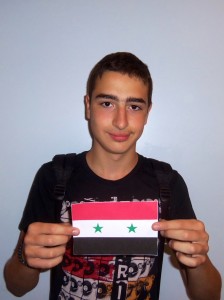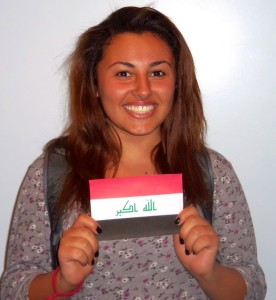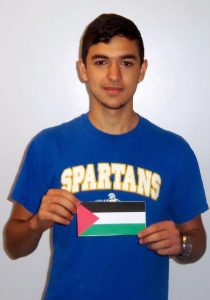Three students share their experiences with war
Although many teenagers have family members who have served in the Middle East, some teens have come to SC from this area. According to the 2010 Census, 2.5 percent of the population in California is Arab-American refugees.
Below are the stories of three students who came to SC from the Middle East. They are from three different places – Syria, Iraq, and Jerusalem – but they share one thing: each of their lives have been touched by war.
Akram Khalaf

One November morning last year, freshman Akram Khalaf boarded his school bus in front of his former home in Syria, which since 2011 has been mired in a civil war between rebels and government forces. On that day, however, someone apparently planned to blow up the bus.
The bus drove two minutes down his street and suddenly broke down, holding up seven other school buses behind them. Suddenly a bomb exploded at the drop-off location, several hundred yards down the road.
A devout Christian, Khalaf said, “[God] made the bus break down to save [my bus and] seven other buses filled with children.” The Syrian army soon arrived, to carry away crying children to their distraught parents.
That was not the only time violence touched Khalaf’s life. One day at their home in Damascus, Khalaf’s father discovered a stray bullet lodged in his son’s bed.
Khalaf and his family lived in a Christian neighborhood in Damascus roughly a year ago. They left from Damascus to Lebanon and from there to the United States. They have been in America for roughly two months.
They came to America, Khalaf said, to become a part of the “English way.”
Rafal Saeed

For their winter break last year, senior Rafal Saeed’s family decided to visit relatives they had not seen for ten years. Only, Saeed’s relatives are not in California. They live in Iraq, where insurgents have been battling the government since U.S. troops withdrew in 2011.
While Saeed did not experience any violence in her hometown, she did experience the destruction the fighting caused.
“There’s no government. Everything is so messy,” Saeed said, adding that not only is the government in shambles, the infrastructure is too.
“All of the streets were torn up, bombed. Everything,” Saeed said, including the buildings.
Saeed’s parents brought her to America at the age of four so she would not have to struggle and would be able to receive a better education. When they returned, Saeed said, her mother could not recognize their hometown.
“Every corner of the street you see military troops with guns to check your car,” said Saeed.
Sami Irani

Irani was born in the United States, but returned with his family to Palestine when he was four, where he spent most of his youth.
In Palestine, Irani witnessed many events that stay with him to this day. The Palestinian army arrested his friends in the West Bank, a politically charged border region claimed by both Palestine and Israel.
“They were standing up for themselves [against the army],” said Irani. His friends were found guilty of disobeying the army’s orders at a protest against the Palestinian-Israeli war in Gaza. They were sentenced to jail time and their release date is unknown.
Irani and his family eventually left Palestine for Saudi Arabia. They came back to America in the summer of 2012. They have been here for roughly a year.
Although Irani came to America for a better education and new life, memories of Palestine still linger.
“I stopped getting attached to anyone,” said Irani. “I try not to. I know at the end something’s going to happen.”

